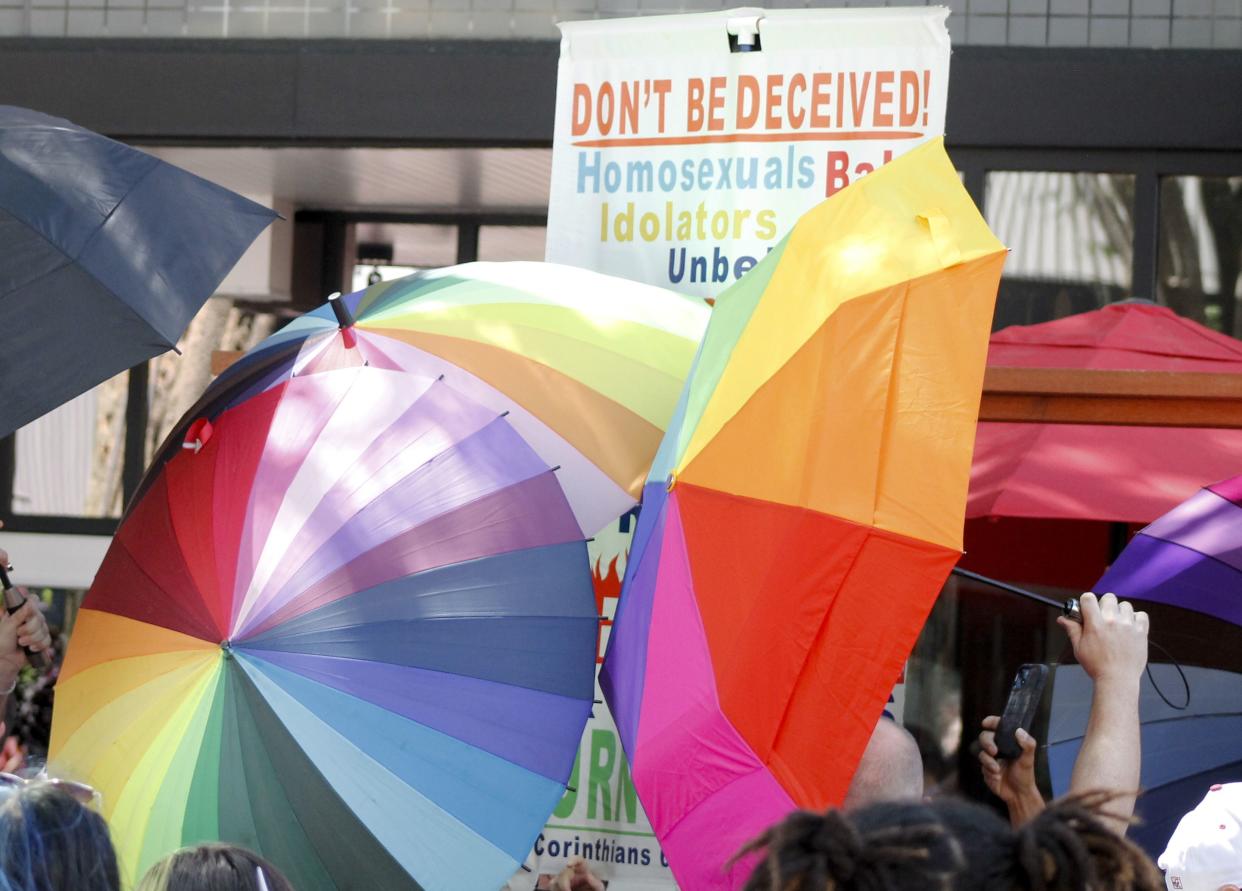Anti-LGBTQ language on social media surged more than 400% following Florida’s ‘Don’t Say Gay’ law, researchers say
The aftermath of Florida’s so-called “Don’t Say Gay” law saw a dramatic increase in online anti-LGBTQ hate as platforms enable extreme politicians and public figures by allowing them to promote their hateful and discriminatory rhetoric, according to a recent analysis of digital content.
Social media posts including slurs like “groomers” and “pedophiles” increased by 406% in the month after the approval of Florida’s “Don’t Say Gay” measure, according to a report released Wednesday by the Human Rights Campaign, the nation’s largest civil LGBTQ equality, and the Center for Countering Digital Hate, a nonprofit that tracks online hate and misinformation.
The controversial anti-LGBTQ legislation was signed into law by Gov. Ron DeSantis in March despite fierce opposition by critics. Slammed as “hateful,” “homophobic,” “transphobic” and “dangerous” the law, which went into effect last month, prohibits school districts from encouraging classroom discussion “about sexual orientation or gender identity in primary grade levels or in a manner that is not age-appropriate or developmentally appropriate for students.”
The report, “Digital Hate: Social Media’s Role in Amplifying Dangerous Lies About LGBTQ+ People,” also found that a large part of the anti-LGBTQ rhetoric was driven by a small group of extremists — including members of Congress Marjorie Taylor Greene and Lauren Boebert, DeSantis’ press secretary Christina Pushaw, as well as pro-Trump activists like “Libs of TikTok” founder Chaya Raicheck.

A sign-carrying anti-gay protester is surrounded by a sea of Pride umbrellas during the Pride parade in Winston-Salem, N.C., on June 18, 2022. (Skip Foreman/)
Researchers said that the 500 of the most-viewed tweets advancing a false ‘“grooming” narrative, one that portrays LGBTQ people seeking to “convert” or “recruit” heterosexual and cisgender children, were viewed at least 72 million times.
After anonymously flagging such incidents using Twitter’s reporting tools, researchers found that the platform failed to act on 99% of the 100 most-viewed hateful tweets identified in the report — even though the slurs clearly violated Twitter’s “Hateful Conduct” policy.
Such failure to act could lead to dangerous consequences, amid a growing wave of anti-LGBTQ hate, seen both online and in real life.
“As social media platforms fail to enforce their own standards — enabling a wave of online anti-LGBTQ+ hate to grow without restraint — extremists are wielding dangerous influence, seeking to radicalize Americans, incite hate against LGBTQ+ people, and mobilize the extremists within their base ahead of the midterm elections,” HRC Interim President Joni Madison told the Daily News in an emailed statement.
“But the rise of this online vitriol doesn’t just have political implications,” she added. “There are deadly, real-world consequences as violent rhetoric leads to stigma, radicalization, and ultimately violence.”
According to the organization, nearly one in five of any type of hate crime is now motivated by anti-LGBTQ+ bias. Transgender women of color are especially at risk, as the last two years have been the deadliest for transgender and gender-nonconforming people.
Last year marked the deadliest year on record for trans people in the United States, with at least 56 deaths — nearly all of them Black and Latina trans women. The previous record was registered in 2020 when at least 44 trans people were murdered in the country.
“We’re in the middle of a growing wave of hate and demonization targeting LGBTQ+ people — often distributed digitally by opportunistic politicians and so-called ‘influencers’ for personal gain,” according to Imran Ahmed, CEO of the Center for Countering Digital Hate.
“Online hate and lies reflect and reinforce offline violence and hate. The normalization of anti-LGBTQ+ narratives in digital spaces puts LGBTQ+ people in danger,” Ahmed added, slamming social media platforms for their willingness “to turn a blind eye” to bad actors.
